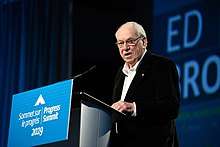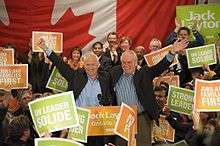Ed Broadbent
John Edward "Ed" Broadbent PC CC (born March 21, 1936) is a Canadian social-democratic politician, political scientist, and chair of the Broadbent Institute, a policy thinktank. He was leader of the New Democratic Party from 1975 to 1989. In the 2004 federal election, he returned to Parliament for one additional term as the Member of Parliament for Ottawa Centre.
Ed Broadbent | |
|---|---|
 Broadbent in 2019 | |
| Leader of the New Democratic Party | |
| In office July 7, 1975 – December 5, 1989 | |
| Preceded by | David Lewis |
| Succeeded by | Audrey McLaughlin |
| Member of the Canadian Parliament for Ottawa Centre | |
| In office June 28, 2004 – January 23, 2006 | |
| Preceded by | Mac Harb |
| Succeeded by | Paul Dewar |
| Member of the Canadian Parliament for Oshawa Oshawa—Whitby (1968-1979) | |
| In office June 25, 1968 – February 1, 1990 | |
| Preceded by | Michael Starr |
| Succeeded by | Mike Breaugh |
| Personal details | |
| Born | John Edward Broadbent March 21, 1936 Oshawa, Ontario, Canada |
| Political party | New Democratic |
| Spouse(s) |
|
| Residence | Ottawa, Ontario, Canada |
| Alma mater | Trinity College, Toronto |
| Profession | Politician, Professor, Pilot |
Life and career
Broadbent was born in Oshawa, Ontario.
In 1961, he married Yvonne Yamaoka, a Japanese-Canadian town planner whose family was interned by the federal government in World War II. They divorced in 1967. On September 22, 1988, when the Mulroney government apologized for the internment, Broadbent brought up Yamaoka's experiences during his remarks in the House of Commons.[1]
In 1971, he married a young Franco-Ontarian widow, Lucille Munroe.
Broadbent married Marxist historian and political theorist Ellen Meiksins Wood, an old friend, in 2014. She died in 2016 at the age of 73.[2]
He has a Doctor of Philosophy (PhD) degree in political science from the University of Toronto (1966) and his PhD thesis, was titled The Good Society of John Stuart Mill.[3] He is currently Fellow in the School of Policy Studies at Queen's University, Canada.
Politics
He was a university professor when he ran and won election to the House of Commons of Canada from Oshawa—Whitby in the 1968 general election, defeating former Progressive Conservative cabinet minister Michael Starr by 15 votes. In 1971, he ran for the leadership of the party but lost to David Lewis at the NDP leadership convention. He won the 1975 leadership election to succeed Lewis, and led the party through four elections.
In his early years as leader of the party, Broadbent was criticized for his long and complex speeches on industrial organization, but he came to be known as an honest and charismatic politician in person. He was one of the first Canadian politicians to stage a large number of political events in the workplace.
The NDP finished with 30 seats in the 1984 federal election, just ten behind the Liberal Party of Canada led by John Turner. Several polls afterward showed that Broadbent was the most popular party leader in Canada. Broadbent was the first leader ever to take the NDP to first place in public opinion polling, and some pundits felt that the NDP could supplant Turner's Liberals as the primary opposition to the Progressive Conservative Party of Canada of Brian Mulroney.
Nonetheless, he was not successful in translating this into an election victory in the 1988 federal election, since the Liberals reaped most of the benefits from opposing free trade. However, the NDP won 43 seats, a record unchallenged until the 2011 federal election, in which the NDP won 103 seats and Jack Layton became the leader of the opposition.
On the international front, while Willy Brandt was President of the Socialist International, Broadbent served as a Vice-President from 1979 to 1989. He stepped down after 15 years as federal leader of the NDP in 1989 at the Winnipeg Convention, where he was succeeded by Audrey McLaughlin. In the decade following Broadbent's retirement from politics, the federal NDP declined in popularity. It would not come close to the popularity it enjoyed under Broadbent until Layton took over the leadership in 2003.
Broadbent was director of the International Centre for Human Rights and Democratic Development from 1990 to 1996. In 1993, he was made an Officer of the Order of Canada and was promoted to Companion in 2001.
Broadbent spent a year as Fellow at All Souls College, University of Oxford, in 1996-7. At Layton's invitation, he returned to politics in 2004,[4] with the aid of a humorous and popular video clip,[5] to successfully run for Parliament in the riding of Ottawa Centre, where he now lives. He defeated Liberal candidate Richard Mahoney, a close ally of Prime Minister Paul Martin.[6]

In the NDP shadow cabinet, Broadbent was Critic for Democracy: Parliamentary & Electoral Reform, Corporate Accountability as well as Child Poverty.
On May 4, 2005, he announced that he would not seek re-election in the 2006 federal election in order to spend time with his wife, Lucille, who was suffering from cancer.[7] She died on November 17, 2006.[8][9] Broadbent's third wife, Ellen Meiksins Wood, whom he married in 2014, died of cancer at the couple's Ottawa home at the age of 73 in January, 2016. Meiksins Wood was a noted political theorist and socialist historian, author of a number of books and a professor at York University for three decades.
Partial election results
| 2004 Canadian federal election: Ottawa Centre | ||||||||
|---|---|---|---|---|---|---|---|---|
| Party | Candidate | Votes | % | Expenditures | ||||
| New Democratic | Ed Broadbent | 25,734 | 41.05 | $75,600.35 | ||||
| Liberal | Richard Mahoney | 19,478 | 31.07 | $77,325.72 | ||||
| Conservative | Mike Murphy | 11,933 | 19.03 | $37,895.42 | ||||
| Green | David Chernushenko | 4,730 | 7.54 | $24,313.40 | ||||
| Marijuana | Michael Foster | 455 | 0.72 | – | ||||
| Independent | Robert Gauthier | 121 | 0.19 | – | ||||
| Communist | Stuart Ryan | 90 | 0.14 | $379.63 | ||||
| Canadian Action | Carla Marie Dancey | 76 | 0.12 | – | ||||
| Marxist–Leninist | Louis Lang | 67 | 0.10 | – | ||||
| Total valid votes | 62,684 | 100.00 | ||||||
| Total rejected ballots | 270 | |||||||
| Turnout | 62,954 | 70.35 | ||||||
Retirement
In November 2008, Broadbent and former Prime Minister Jean Chrétien came out of retirement to help negotiate a formal coalition agreement between the Liberals and the New Democratic Party, which would be supported by the Bloc Québécois. The coalition was formed in a bid to replace the Conservative Government of Prime Minister Stephen Harper, and would have been the first in Canada since World War I.[10] However, the coalition talks died down after Governor General Michaëlle Jean prorogued parliament in December 2009.[11]
Broadbent has voiced his support for the Campaign for the Establishment of a United Nations Parliamentary Assembly, an organisation which advocates for democratic reform in the United Nations, and the creation of a more accountable international political system.[12]
On June 17, 2011, he announced the creation of the Broadbent Institute to explore social-democratic policy and ideas. It provides a vehicle for social-democratic and progressive academics, provides education and trains activists. It is independent of the New Democratic party.[13]
On September 12, 2011, he endorsed Brian Topp in his unsuccessful campaign for the leadership of the NDP.[14]
Archives
There is an Ed Broadbent fonds at Library and Archives Canada[15]. Archival reference number is R5828.
References
- "Relocation to Redress: The Internment of the Japanese Canadians". CBC News. Archived from the original on 4 June 2011.
- "Ellen Meiksins Wood, author and third wife of Ed Broadbent, dead at 73". Victoria Times-Colonist. Canadian Press. January 14, 2016. Archived from the original on January 14, 2016. Retrieved January 14, 2016.
- Steed, Judy (1988). Ed Broadbent: The Pursuit of Power. Viking. p. 55.
- "Broadbent returns to political stage". The Chronicle Herald. December 19, 2003. Archived from the original on January 13, 2004. Retrieved 2015-05-18.
- "Broadbent raps with 'Ed's back!' - CBC Archives".
- "Broadbent returns to House". The Ottawa Citizen. June 29, 2004. Archived from the original on March 24, 2016. Retrieved 2015-05-18.
- "Broadbent won't run again". The Globe and Mail. May 4, 2005. Retrieved 2015-05-18.
- "Ed Broadbent's 'moral compass' loses battle with cancer". The Globe and Mail. November 18, 2006. Retrieved 2015-05-18.
- "Wife of former NDP leader Broadbent dies". CBC News. November 19, 2006. Retrieved 2015-05-18.
- "Harper scrambles to retain power", Toronto Star, November 29, 2008.
- CAMPBELL CLARK, "A hot debate about head of state," The Globe and Mail, October 10, 2009.
- "Overview". Campaign for a UN Parliamentary Assembly. Retrieved 2017-10-09.
- "Broadbent announces new left-wing institute", CBC, June 17, 2011.
- "Brian Topp first to declare for NDP leadership race", CBC, Sep 18, 2011.
- "Finding aid to Ed Broadbent fonds, Library and Archives Canada" (PDF). Retrieved May 14, 2020.
| Wikimedia Commons has media related to Ed Broadbent. |
External links
- How'd They Vote?: Ed Broadbent's voting history and quotes
- Office of the Governor General of Canada. Order of Canada citation. Queen's Printer for Canada. Retrieved 24 May 2010
- Ed Broadbent – Parliament of Canada biography
| Parliament of Canada | ||
|---|---|---|
| Preceded by Electoral District created in 1968 known as Oshawa—Whitby until 1979 |
Member of Parliament For Oshawa 1968–1990 |
Succeeded by Mike Breaugh NDP |
| Preceded by Mac Harb Liberal |
Member of Parliament For Ottawa Centre 2004–2006 |
Succeeded by Paul Dewar NDP |
| Party political offices | ||
| Preceded by David Lewis |
Leader of the New Democratic Party 1975–1989 |
Succeeded by Audrey McLaughlin |
